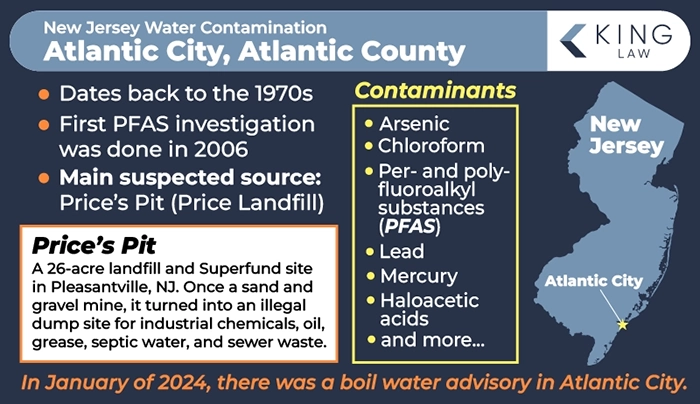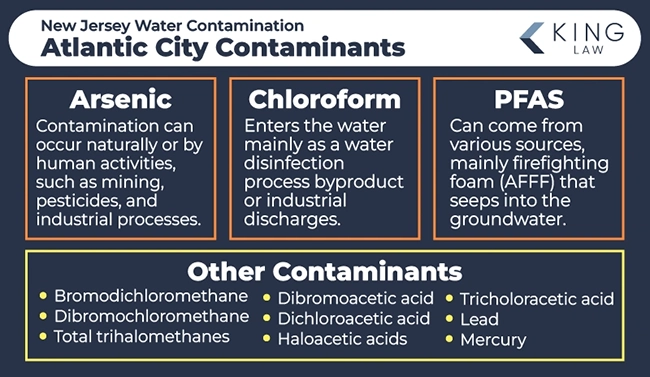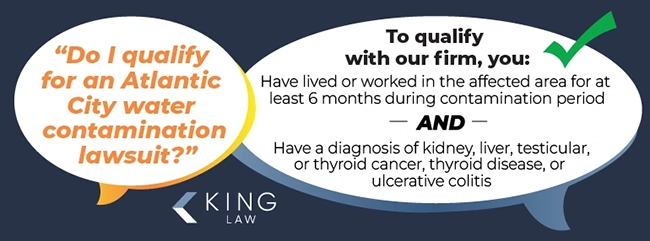
Individuals in Atlantic City, NJ, are filing PFAS water contamination lawsuits due to the serious health risks associated with exposure to per- and polyfluoroalkyl substances (PFAS). These chemicals, often referred to as “forever chemicals,” have been linked to many severe health conditions including kidney cancer, liver cancer, testicular cancer, thyroid cancer, thyroid disease, ulcerative colitis, and more. Those who have been exposed to PFAS in drinking water and diagnosed with a related illness are filing lawsuits against manufacturers to recover compensation for medical bills, lost wages, and other damages. The litigation is ongoing, with numerous lawsuits already in progress and the number growing as more affected individuals come forward.
Atlantic City Water Contamination Overview
Historical records about Atlantic City date back to the 1670s. The city continued to flourish and grow over the next 200 years, becoming a busy seaport and place for tourists to visit throughout the year. The 1800s were particularly big for the city’s growth as its population grew and new forms of entertainment arose along the boardwalk and piers. Atlantic City continued to draw tourists from across the country until its gradual decline during and after World War II.
In the 2010s, Atlantic City faced a renaissance. Renovations, new casinos, a refurbished boardwalk, and pier overhauls have returned the “playground” city to its roots, providing entertainment and enjoyment for its visitors. However, one issue has been constant—water contamination.
Atlantic City Water Contamination Updates
Despite the city’s rich history and promising reinvigoration, it continues to face issues with water contamination. Those who have faced long-term exposure to contaminated water at Atlantic City are at particular risk of serious health conditions and may be entitled to compensation through a lawsuit. Here is a brief history of contamination concerns with Atlantic City’s water:
- 2006: New Jersey first investigated PFAS in public drinking water near areas known for using, storing, or disposing of PFAS-containing materials.
- April 2014: Various perfluorinated chemicals were found when testing drinking water sources at Atlantic City, including surface water from Doughty Pond and Kuehnle Pond, which provide drinking water for the city.
- June 2018: Sampling of 992 private wells found PFOA (one type of PFAS) in 427 wells and PFOS (another type of PFAS) in 304 wells.
- November 2019: The Environmental Working Group (EWG) reported that PFAS contamination was found in more than 500 New Jersey water systems/sources with many water systems in New Jersey testing at levels higher than 70 ppt, which at the time was “the inadequate lifetime health advisory level set by the EPA for PFOA and PFOS.”
- June 2020: New Jersey finalized PFAS regulations for the state to propel water restoration efforts, particularly for cities with elevated levels of PFAS toxicity like Atlantic City.
- 2021: The EWG identified 42 total contaminants in Atlantic City drinking water from 2014-2019, 13 of which exceeded its health guidelines, including arsenic and PFAS.
- March 2022: The Atlantic City Municipal Utilities Authority (ACMUA) issued a press release sharing plans to address harmful levels of lead and PFAS in Atlantic City groundwater, citing migrating contamination from a nearby Superfund site, Price’s Pit.
- May 2023: A team of data journalists conducted an analysis of drinking water across the United States and found that New Jersey ranked #2 for the highest amount of PFAS contamination. During the same month, ACMUA sought solutions to remove PFAS from water.
About Atlantic City Water Contamination:
History of Water Contamination in Atlantic City, New Jersey
Sources of Water Contamination in Atlantic City
Atlantic City Water Contamination Map
Contaminants Found in Atlantic City Drinking Water
Current Water Quality in Atlantic City
Health Risks Linked to Drinking Water in Atlantic City
Eligibility Criteria for the Atlantic City Water Contamination Lawsuit
Atlantic City Water Contamination Settlement and Payout Amounts
How to File an Atlantic City Water Contamination Lawsuit
Statute of Limitations for Atlantic City Water Contamination Cases
History of Water Contamination in Atlantic City, New Jersey
Much of Atlantic City’s water contamination dates back to the 1970s and stems from Price Landfill, also known as Price’s Pit. Disposal of hazardous wastes into the ground contaminated soil and groundwater. Some contaminated water sources carry water throughout New Jersey, spreading toxic chemicals into the drinking water of multiple communities, including Atlantic City.
Lead, arsenic, benzene, chloroform, vinyl chloride, and dichloroethane are some of the first chemicals of concern in Atlantic City drinking water, dating back to the 1970s and 1980s. The first investigation for PFAS in public drinking water didn’t happen until 2006 by the New Jersey Department of Environmental Protection (NJDEP). It has been a concern since then and still is today.

Sources of Water Contamination in Atlantic City
Price’s Pit, a 26-acre landfill and Superfund site in Pleasantville, NJ, is noted as the main source of water contamination for Atlantic City. The site was once a sand and gravel mine until it was converted into a commercial landfill in 1971. For around eight years, various wastes were dumped into the pit, including industrial chemicals, oil, grease, septic water, and sewer waste. Various contaminants, including arsenic, benzene, chloroform, dichloroethane, lead, and vinyl chloride migrated through soil, air, groundwater, and waterways to Atlantic City.
Another likely source of toxins found in Atlantic City water is the Atlantic City Naval Air Station. The EPA began investigating contamination at the base in 2011 when it ceased operations. It began addressing these issues in 2014 after confirming PFAS was in the site’s groundwater, its drinking water, and the drinking water of nearby communities. PFAS contamination came from the military’s use of firefighting foam that contained the cancer-causing chemicals.
Atlantic City Water Contamination Map
Reference the Atlantic City water contamination map to understand the extent and spread of contamination throughout the city.
Contaminants Found in Atlantic City Drinking Water
Atlantic City’s drinking water has tested positive for numerous contaminants, including arsenic, benzene, PFAS, and more, raising significant public health concerns. The presence of these harmful substances in the water supply poses a heightened risk of various diseases for residents, including many different types of cancer.
Arsenic
Arsenic can enter drinking water from nature and human activities. Naturally, it leaches into groundwater from rocks and soil that contain arsenic minerals. Human activities, such as mining, using arsenic-containing pesticides, and industrial processes, can also contribute to contamination.
Atlantic City has had arsenic levels in drinking water more than 25 times the EWG Health Guideline. Chronic exposure to arsenic in drinking water poses significant health risks, including skin lesions, cardiovascular disease, diabetes, and various cancers, including skin cancer, bladder cancer, and lung cancer. Long-term exposure can also lead to developmental effects, neurotoxicity, and impaired cognitive function.
Chloroform
Chloroform can enter drinking water primarily as a byproduct of water disinfection processes. When chlorine reacts with natural organic substances, such as decaying vegetation, chloroform and other byproducts can form. Industrial discharges can also contribute to chloroform contamination.
Chloroform levels have tested 42 times the EWG health guideline in Atlantic City drinking water. Long-term exposure to chloroform in drinking water poses several health risks, including liver and kidney damage, reproductive issues, nervous system problems, and an increased risk of cancer, especially liver cancer and kidney cancer.
Per- and poly-fluoroalkyl substances (PFAS)
Per- and poly-fluoroalkyl substances (PFAS) can enter drinking water through various sources, with firefighting foam (AFFF) being a main contributor, especially in locations near military bases. These foams, often used in firefighting training and emergency responses at military bases and industrial sites, contain high levels of PFAS. The foam can seep into the ground and contaminate soil and groundwater before making its way into drinking water supplies.
PFAS are persistent in the environment and the human body, which is why they are often referred to as “forever chemicals.” Health risks associated with PFAS exposure include increased cancer risk (including kidney cancer, liver cancer, testicular cancer, thyroid cancer, thyroid disease, ulcerative colitis.
PFAS levels have been extremely high in Atlantic City water. For example, PFHxS tested 68 times higher than the EWG health guideline, PFOS tested 33x the guideline, and PFOA tested 1,714 times the guideline.
Other Contaminants
Numerous other contaminants have been found in Atlantic City drinking water. Most have exceeded health guidelines and even resulted in boil water advisories because the water wasn’t safe for residents to drink.
- Bromodichloromethane: Increased risk of liver and kidney cancer, reproductive toxicity, and liver and kidney damage
- Chloroform: Increased risk of liver and kidney cancer, liver and kidney damage, and central nervous system problems
- Dibromoacetic acid: Increased risk of cancer, reproductive and developmental toxicity, and liver damage
- Dibromochloromethane: Increased risk of cancer, liver and kidney damage, and reproductive toxicity
- Dichloroacetic acid: Increased risk of cancer, liver damage, and development effects
- Haloacetic acids (HAA5 and HAA9): Increased risk of cancer, liver and kidney damage, and developmental and reproductive toxicity
- Lead: Neurotoxicity, cardiovascular issues, and kidney damage
- Mercury: Neurological damage, kidney damage, suppressed immune system
- Total trihalomethanes (TTHMs): Increased risk of bladder, colon, and rectal cancer, liver and kidney damage, and reproductive and developmental toxicity
- Trichloroacetic acid: Increased risk of cancer, liver damage, and skin irritation and damage

Current Water Quality in Atlantic City
Atlantic City’s water quality is still poor due to contaminants. In January of this year, there was a drinking water warning where residents were advised not to drink their water without boiling it first. PFAS is also still a concern with officials closely monitoring the migration of contaminants from nearby landfills and military bases.
Water Treatment Efforts at Atlantic City, New Jersey
Atlantic City has made significant efforts to help ensure safe drinking water. Water treatment plants utilize advanced technologies like sedimentation, coagulation, and flocculation to remove impurities. Then disinfection with chemicals like chlorine or ultraviolet light kill harmful microorganisms to ensure the water meets safety standards set by the EPA.
In recent years, Atlantic City has upgraded its water treatment efforts to address new contaminants. This includes modernizing treatment facilities, using advanced monitoring systems, and enhancing distribution networks to prevent leaks. The city also runs public awareness campaigns on water conservation and quality.
Health Risks Linked to Drinking Water in Atlantic City
Long-term exposure to contaminants found at Atlantic City has been associated with a wide range of severe health issues. Prolonged exposure to PFAS, arsenic, and other hazardous substances can significantly increase the risk of various cancers and serious health conditions, including:
- Kidney cancer
- Testicular cancer
- Thyroid cancer
- Bladder cancer
- Prostate cancer
- Liver cancer
- Breast cancer
- Non-Hodgkin’s lymphoma
- Hodgkin’s lymphoma
- Leukemia
- Thyroid disease
- Ulcerative colitis
- Other chronic conditions
Given the severe health risks associated with these contaminants, regular health check-ups and screening programs are essential for early detection and management. Individuals diagnosed with a serious condition could be eligible for compensation to help with treatment costs and medical bills through a PFAS lawsuit.
Eligibility Criteria for the Atlantic City Water Contamination Lawsuit
To be eligible for an Atlantic City water contamination lawsuit, individuals must meet specific criteria. Key qualifications include:
Duration of Exposure:
- Individuals need to have lived or worked in the affected municipality for at least 6 months during the contamination period.
Specific Diagnoses: Our firm is evaluation cases with a diagnosis of:
- Kidney cancer
- Liver cancer
- Testicular cancer
- Thyroid cancer
- Thyroid disease
- Ulcerative colitis
Required documentation: includes medical records confirming the diagnosis and proof of residence or employment during the contamination period, such as utility bills, lease agreements, or employment records.
These factors are critical in building a strong legal claim and solidifying any chance for compensation eligibility. Consulting with specialized attorneys, like those at King Law, is essential to navigate the legal process effectively.

Atlantic City Water Contamination Settlement and Payout Amounts
Several key factors will influence potential settlement amounts for Atlantic City water contamination lawsuits. The extent of exposure to contaminants will play a crucial role in determining compensation. Documented health impacts, such as diagnoses of cancer or chronic illnesses directly linked to these contaminants, will also play a large role. Additionally, the duration of residence or employment in the area with toxic water can impact the compensation, with longer exposure periods typically leading to higher settlements. Younger individuals at the time of diagnosis or those with prolonged active illnesses might receive larger settlements due to the increased impact on their quality of life and future earning potential.
Settlements could range from $30,000 to $300,000 depending on the exposure and diagnosis. It’s important to remember that settlements are generally lower than potential trial verdicts, as they reflect a compromise between the chance of a higher award and the risk of receiving nothing at trial. Those affected by water contamination in Atlantic City should consult legal advice to understand their options and potential compensation.
How to File an Atlantic City Water Contamination Lawsuit
Filing a lawsuit for water contamination in Atlantic City, New Jersey involves a detailed and structured process, requiring specific documentation and adherence to local legal considerations. Here is a step-by-step guide to help navigate this complex legal journey:
- Initial Consultation: Begin by consulting with a specialized attorney experienced in environmental law and water contamination cases. This initial meeting will help assess the viability of your claim and provide an overview of the process.
- Gather Evidence: Collect all necessary documentation to support your claim. This includes medical records, proof of residence or employment, environmental studies, and more.
- Legal Filing: Your attorney will prepare and file the necessary legal documents, including the complaint, which outlines your allegations against the responsible parties and the damages you seek. This step must be completed within the statute of limitations, which in New Jersey is typically two years from the date of diagnosis or discovery of the injury.
- Pre-Trial Procedures: Engage in pre-trial activities, such as discovery, where both parties exchange relevant information and evidence. This phase may also involve depositions and interrogatories to gather further details.
- Settlement Negotiations: Many cases are resolved through settlement negotiations before going to trial. Your attorney will negotiate with the defendants to reach a fair settlement that adequately compensates you for your damages.
- Trial: If a settlement cannot be reached, your case will proceed to trial. Your attorney will present the evidence and argue your case before a judge or jury, who will then decide on the outcome and potential compensation.
It’s typically favorable to work with an attorney experienced in handling such cases, especially to navigate unique considerations for Atlantic City. For example, it can be helpful to have someone familiar with New Jersey’s local environmental regulations, the state’s statute of limitations, and both municipal and state-level contamination impacts.
Evidence to Support Your Atlantic City Water Contamination Case
Substantiating claims in Atlantic City, New Jersey water contamination cases requires comprehensive evidence to prove the connection between toxic exposure and resulting health issues. This evidence not only supports the claim’s validity but also strengthens the case for obtaining fair compensation. Tangible evidence often includes:
- Medical documentation: Detailed records of diagnoses, treatments, and health conditions linked to toxic exposure.
- Proof of residence or employment: Documents such as utility bills, lease agreements, or employment records demonstrating residence or work in the affected area during the contamination period.
- Environmental studies: Reports and studies detailing the levels of contaminants in the water supply.
- Expert testimonies: Statements from medical professionals linking health conditions to the exposure, and environmental experts confirming the contamination.
- Personal statements: Written accounts of exposure, health issues, and the impact on daily life.
- Photographic evidence: Photos of affected areas, if relevant, and any visible signs of contamination or health impacts.
- Receipts and bills: Documentation of expenses related to medical treatments and health care resulting from the exposure.
Collecting and organizing this evidence is crucial for building a robust case. The importance of comprehensive documentation cannot be overstated, as it plays a central role in demonstrating the legitimacy of the claim and achieving a favorable outcome.
Statute of Limitations for Atlantic City Water Contamination Cases
Understanding the statute of limitations is crucial for individuals seeking compensation in Atlantic City water contamination lawsuits. Victims must file their lawsuit within a specific timeframe to qualify for compensation.
The time limits for filing can vary significantly based on the state and the specifics of each case. So it’s essential to consult with an attorney who specializes in environmental or personal injury law to avoid losing eligibility. Schedule a consultation as soon as possible to initiate the case and enhance the likelihood of a successful claim.
Atlantic City Water Contamination Lawyers
King Law attorneys are experienced in Atlantic City, New Jersey water contamination lawsuits, bringing extensive knowledge in environmental cases, particularly those involving PFAS and municipal water contamination. With a deep understanding of the complexities surrounding toxic exposure, they offer comprehensive legal services, including meticulous claim evaluation, thorough document preparation, and robust legal representation. Their proficiency in handling such cases ensures that every aspect of the claim is addressed, from gathering and analyzing medical records and proof of residence to negotiating settlements and representing clients in court.
Choosing a qualified attorney like those at King Law is crucial for individuals affected by water contamination in Atlantic City. The legal guidance provided by experienced environmental lawyers can make a significant difference in the outcome of a case. King Law’s attorneys are well-versed in the specific statutes and regulations governing environmental claims, ensuring that clients meet all legal requirements and deadlines. Reach out today to schedule a free, no-obligation consultation.
Frequently Asked Questions (FAQs)
Learn more about Atlantic City water contamination with these frequently asked questions.

